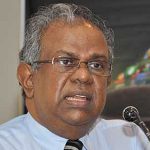Interview Rev. Sakthivel:
Sri Lanka’s Political Prisoners ‘An Obstacle To True Reconciliation’
Human rights activist and Anglican pastor, Marimuthu Sakthivel, believes around 150 political prisoners should be released immediately. In an interview, he explains why.
After the Sri Lankan civil war ended, the government took an estimated 12,000 Tamils prisoner on suspicion of being involved with the armed militia, The Liberation Tigers of Tamil Eelam, more commonly known as the Tamil Tigers. Most of these were eventually released, often because they were considered rehabilitated. But today there are still an estimated 150 or so prisoners left in Sri Lankan prisons, some of whom have been in jail for over a decade.
The Sri Lankan government has said it will act on these cases but by all accounts, there has been little progress. Anglican pastor and human rights activist, Reverend Marimuttu Sathivel, has long been advocating for the release of the Tamil and Sinhalese political prisoners. He believes they should be released without further ado and without any conditions. The Catamaran asked him if it was appropriate to be so generous in this case.
The Catamaran: You say there are 150 or more political prisoners still in government jails. Many would disagree with that definition of political prisoners. So who are they?
Marimuthu Sakthivel: A lot of people just watch but there are those who struggle for a just society. If people are taken into custody because of such activities, we can call them political prisoners.
Political rebellion is neither criminal nor terrorist in nature. It is the reaction of the oppressed against an oppressive system.
The Catamaran: So were these prisoners terrorists or are they revolutionaries?
Sakthivel: Ordinary Sri Lankan law says that a person who has been arrested should appear in court within 24 hours. Only, these people were not arrested under ordinary criminal law. They were arrested under the Prevention of Terrorism Act and under this, the authorities can keep them in prison for a long time, even for years, without bail.
Sinhalese rebels in the south, between 1988 and 1989, were crushed using the same law. It is a law that is against human rights, ethics and religion.
We believe that political rebellion is neither criminal nor terrorist in nature. It is the reaction of the oppressed against an oppressive system.
Some of these prisoners were trialled in a special court, they signed documents written in a language they did not understand and then they were imprisoned. That is why the government says they are not political prisoners and that they are criminals. But if you look into the details of these cases you will realize this is simply not true.
The Catamaran: But some have said that if these people are released, they will simply take up weapons again.
Sakthivel: This is an unfounded fear created for political reasons. This criticism is being levelled at about 160 of the most unfortunate people who were in no way connected with the leaders of the Tamil Tigers.
The ordinary people who lived under the Tamil Tigers couldn’t stay out of it – they were involved, whether directly or indirectly. It is their children, brothers, grandchildren and sisters who became Tigers. We should think carefully about what we would do, if we were in their position.
The Catamaran: You say the prisoners remaining in custody are the most unfortunate. Why?
Sakthivel: Because almost all of the frontline leaders who were arrested have been released. Those who remain in custody are there because of anomalies with their cases. For example, the prisoner accused of an assassination is apparently an old man who happened to be cutting firewood near the murder scene. Another alleged attempted murder was committed by someone who never even left his hometown in that period. A lot of these problems are related to the legal process, and statements written in Sinhalese.
The Catamaran: Are there any Sinhalese among the political prisoners you’re talking about?
Sakthivel: Yes, I believe there are around 12.
The Catamaran: And you say all of these people should be given unconditional pardons and released. That seems rather generous.
Sakthivel: Sri Lanka has several significant religions and all of them advocate this kind of generosity and forgiveness. But more than anything this is about justice.
Under the present legal framework there is no solution. So a political decision needs to be made. In the past Sri Lankan leaders have chosen to release prisoners. President Maithripala Sirisena should do the same.
We cannot prevent community distrust by holding these people in prison. In fact, holding them there is an obstacle to genuine reconciliation. If the prisoners are released it could add a new impetus and true meaning to Sri Lankan reconciliation.








